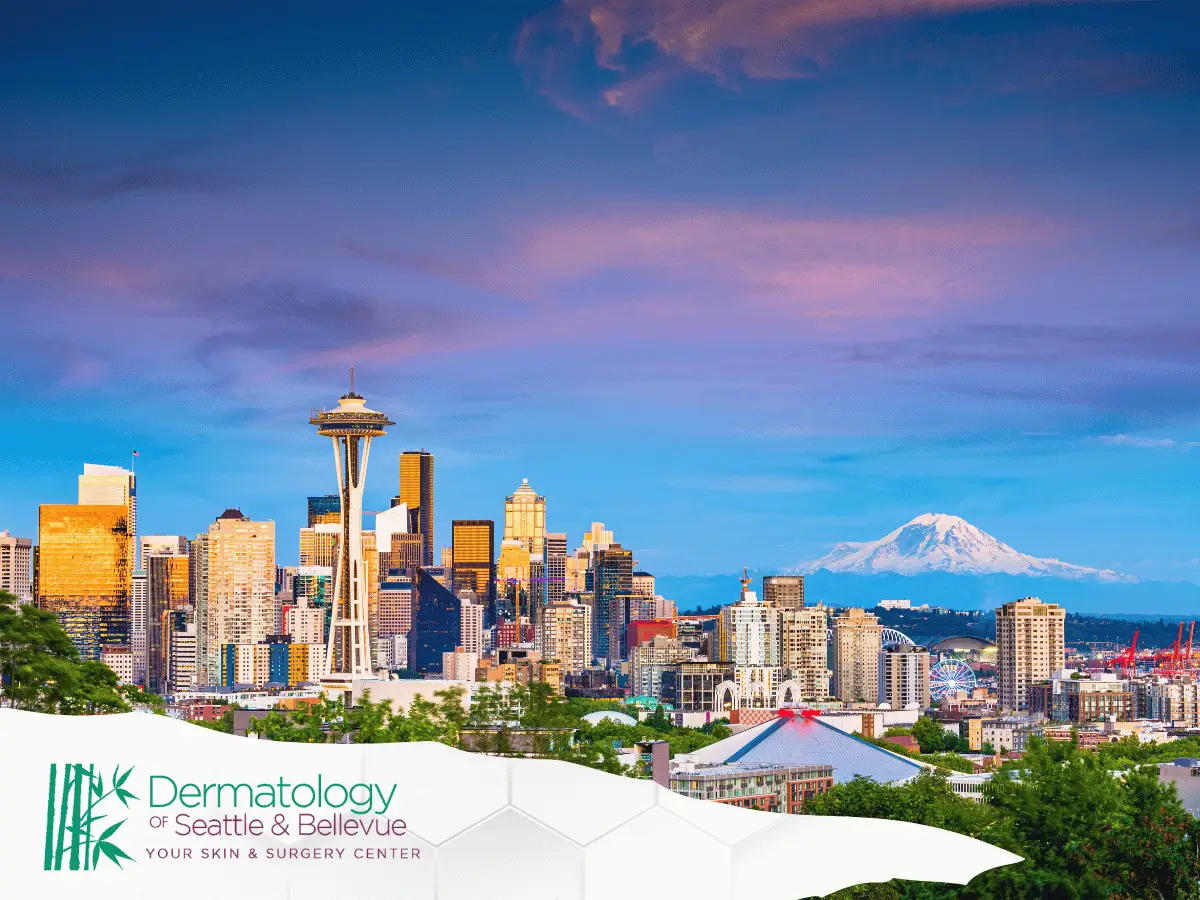Quick Summary
- Seattle’s mild, wet climate fuels allergens like pollen, mold, and dust mites that can affect skin year-round.
- Peak allergy seasons are spring and fall, with tree/grass pollen in spring and weeds in fall.
- Allergens can trigger redness, itching, hives, dryness, and worsen eczema or sensitive skin.
- Irritation and face-touching can increase inflammation, clogged pores, and acne breakouts.
- Reduce impact with gentle cleansing, moisturizing, sunscreen, HEPA air filters, cleaning, and humidity control; see a specialist if severe.
Environmental Allergens in Seattle How They Affect Your Skin
Seattle is renowned for its lush greenery and vibrant environment, but for many residents, this beauty comes with a downside — environmental allergens. These allergens, particularly during allergy season, can significantly impact the air quality and, in turn, affect your skin. Understanding the local allergens in Seattle, their effects, and how to mitigate them can lead to healthier skin and a more enjoyable experience in this beautiful city.

Seattle’s unique climate and geography contribute to the prevalence of certain environmental allergens. The city experiences a mild maritime climate, characterized by wet winters and dry summers. This climate supports a wide variety of plant life, which can release pollen and other allergens into the air.
Common Allergens in Seattle
- Pollen: Trees, grasses, and weeds are the main sources of pollen in Seattle. During spring, trees like alder, birch, and cedar release pollen, while grass pollen is more common in late spring and early summer. In the fall, weeds like ragweed contribute to the pollen count.
- Mold: Seattle’s wet climate creates the perfect conditions for mold growth. Mold spores can be airborne and may trigger allergic reactions, particularly during the damp, rainy months.
- Dust Mites: These microscopic creatures thrive in humid environments and can be a year-round allergen in Seattle homes.
Allergy Season in Seattle
Allergy season in Seattle is primarily during spring and fall when pollen levels are at their highest. However, due to the city’s climate, some people may experience allergies year-round. Understanding the peak times for different allergens can help in planning preventive measures.
How Seattle’s Air Quality Affects Your Skin

Air quality plays a crucial role in skin health. In Seattle, fluctuations in air quality, driven by pollen levels and other environmental factors, can impact your skin in several ways.
Skin Irritation and Allergic Reactions
When allergens like pollen and mold come into contact with the skin, they can cause irritation and allergic reactions. This often manifests as redness, itching, and sometimes hives. People with sensitive skin or existing conditions like eczema may find these reactions more pronounced.
Dryness and Dehydration
Seattle’s changing seasons can also affect skin moisture levels. The transition from wet winters to drier summers can lead to skin dehydration. Additionally, allergens can strip the skin of its natural oils, exacerbating dryness and leading to flakiness or cracking.
Acne and Breakouts
Environmental allergens may also contribute to acne and breakouts. When allergens irritate the skin, they can trigger an inflammatory response, leading to clogged pores and acne. Moreover, touching the face to relieve itching can transfer oils and bacteria, worsening breakouts.
Mitigating the Effects of Environmental Allergens on Your Skin

by PLANTADEA (https://unsplash.com/@plantadea)
Taking steps to protect your skin from environmental allergens can help minimize their impact. Here are some practical strategies:
Skincare Routine Adjustments
- Gentle Cleansers: Use mild, fragrance-free cleansers to remove allergens without irritating the skin.
- Moisturizers: Apply a good quality moisturizer to help maintain the skin’s natural barrier and prevent dryness.
- Sunscreen: Protect your skin from UV rays, especially during summer, as sun exposure can worsen allergic reactions.
Home Environment Modifications
- Air Purifiers: Using an air purifier with a HEPA filter can help reduce indoor allergens like pollen and dust mites.
- Regular Cleaning: Frequent vacuuming and dusting can minimize dust mites and mold spores in your home.
- Humidity Control: Use a dehumidifier to keep indoor humidity levels low, which can deter dust mites and mold growth.
Lifestyle and Diet Considerations
- Hydration: Drink plenty of water to keep your skin hydrated from the inside out.
- Diet: Incorporate foods rich in antioxidants, such as fruits and vegetables, to help your skin combat environmental stressors.
When to Seek Professional Help
While many people can manage mild allergic reactions with over-the-counter treatments and lifestyle adjustments, some may require professional intervention. If you experience persistent or severe skin reactions, consult a dermatologist or an allergist. They can provide tailored advice and may suggest allergy testing to identify specific triggers.
Allergy Testing and Treatments
- Skin Prick Test: This test can identify specific allergens that cause reactions.
- Medication: Antihistamines or topical steroids may be prescribed to alleviate symptoms.
- Allergy Shots: Immunotherapy might be recommended for long-term relief.
Conclusion
Living in Seattle offers countless benefits, from its natural beauty to its vibrant culture. However, the presence of environmental allergens can pose challenges for your skin. By understanding the local allergens, recognizing their effects on your skin, and implementing strategies to mitigate these impacts, you can enjoy everything Seattle has to offer while maintaining healthy, resilient skin.
Being proactive about your skincare routine, modifying your home environment, and making lifestyle adjustments are key steps in combating the effects of environmental allergens. If necessary, don’t hesitate to seek professional help to ensure your skin remains in optimal health throughout the allergy season and beyond.




